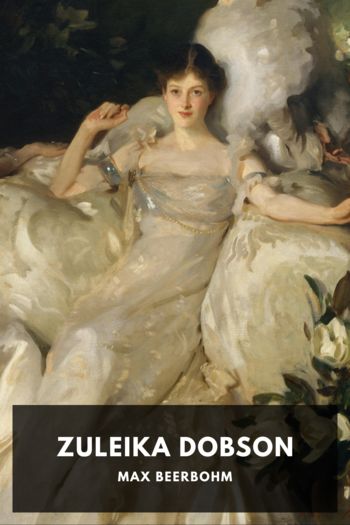The Works of Max Beerbohm - Max Beerbohm (electric book reader .txt) 📗

- Author: Max Beerbohm
Book online «The Works of Max Beerbohm - Max Beerbohm (electric book reader .txt) 📗». Author Max Beerbohm
How much pop-limbo has been talked about the Prince’s denial of the marriage! I grant that it was highly improper to marry Mrs. Fitzherbert at all. But George was always weak and wayward, and he did, in his great passion, marry her. That he should afterwards deny it officially seems to me to have been utterly inevitable. His denial did her not the faintest damage, as I have pointed out. It was, so to speak, an official quibble, rendered necessary by the circumstances of the case. Not to have denied the marriage in the House of Commons would have meant ruin to both of them. As months passed, more serious difficulties awaited the unhappily wedded pair. What boots it to repeat the story of the Prince’s great debts and desperation? It was clear that there was but one way of getting his head above water, and that was to yield to his father’s wishes and contract a real marriage with a foreign princess. Fate was dogging his footsteps relentlessly. Placed as he was, George could not but offer to marry as his father willed. It is well, also, to remember that George was not ruthlessly and suddenly turning his shoulder upon Mrs. Fitzherbert. For some time before the British plenipotentiary went to fetch him a bride from over the waters, his name had been associated with that of the beautiful and unscrupulous Countess of Jersey.
Poor George! Half-married to a woman whom he no longer worshipped, compelled to marry a woman whom he was to hate at first sight! Surely we should not judge a prince harshly. “Princess Caroline very gauche at cards,” “Princess Caroline very missish at supper,” are among the entries made in his diary by Lord Malmesbury, while he was at the little German Court. I can conceive no scene more tragic than that of her presentation to the Prince, as related by the same nobleman. “I, according to the established etiquette,” so he writes, “introduced the Princess Caroline to him. She, very properly, in consequence of my saying it was the right mode of proceeding, attempted to kneel to him. He raised her gracefully enough, and embraced her, said barely one word, turned round, retired to a distant part of the apartment, and calling to me, said: ‘Harris, I am not well: pray get me a glass of brandy.’ ” At dinner that evening, in the presence of her betrothed, the Princess was “flippant, rattling, affecting wit.” Poor George, I say again! Deportment was his ruling passion, and his bride did not know how to behave. Vulgarity—hard, implacable, German vulgarity—was in everything she did to the very day of her death. The marriage was solemnised on Wednesday, April 8th, 1795, and the royal bridegroom was drunk.
So soon as they were separated, George became implected with a morbid hatred for his wife, which was hardly in accord with his light and variant nature and shows





Comments (0)